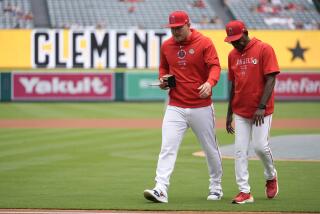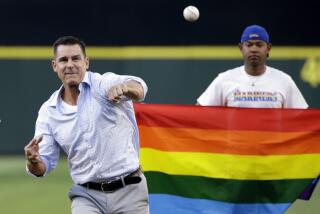BASEBALL / ROSS NEWHAN : If You Don’t Believe Mariners’ Boone Can Play, Ask Him
PEORIA, Ariz. — The Seattle Mariners made room for second baseman Bret Boone by advising Harold Reynolds to pursue free agency, which he did, signing with the Baltimore Orioles.
Seattle’s decision was based on economics--Boone will be paid $1 million less than Reynolds--and the belief that the 23-year-old son of Bob Boone and grandson of Ray Boone is ready.
“We’re bringing along a young player we think will be here for a long time,” General Manager Woody Woodward said.
The club’s confidence is modest compared to the player’s.
Does Boone have any doubts that he’s ready to play full time in the major leagues?
“No, no doubts at all,” he said, adding that he doesn’t want to be perceived as cocky, only confident.
“Supremely confident,” Bob Boone said. “He feels he belongs, and that’s one of the things that got him there. When you see that in a young player, you’re not afraid to move him along.”
The latest Boone to reach the majors played at USC and El Dorado High in Placentia, but his baseball background goes much deeper. Bob Boone holds the major league record for games caught at 2,225 and is managing the Oakland Athletics’ triple-A team at Tacoma. Ray Boone was a major league infielder for 13 years and has long scouted for the Boston Red Sox.
Bret Boone said he was never pushed into baseball and doesn’t think his talent is a family spinoff.
“I’m proud of what they both accomplished and thankful for the background,” he said, having grown up in major league clubhouses. “I’ve experienced things most other kids only dream about, but when you reach a certain level, everyone has to take the next steps on their own.
“I’m lucky enough to have excelled, and I want to keep doing it. I’m excited. This is a great opportunity. Hopefully, I have a great future.”
Bob Boone doesn’t doubt the future, but sees his son’s background a little differently.
“It’s a huge advantage,” he said. “He’s had some valuable lessons from some pretty big names. I mean, what he’s doing now, he’s been doing his whole life. He’s not awed walking into a big league clubhouse. The mystique is gone. But then, it’s only an advantage if he knows he can play, and I know he can. I know he’s ready.”
Father and son are similar in some ways, dissimilar in others. Bob Boone, at 6 feet 2 and 210 pounds, was a ping hitter who had only 105 homers but won seven Gold Gloves. Bret Boone, at 5-10 and 180 pounds, is a questionable fielder with an impressive bat. He hit 19 homers in double-A ball and 13 at triple-A Calgary last year, when he batted .314 and “just killed us” said his father, the Tacoma manager.
The Mariners, who in 1990 became the first team to have a father and son, Ken Griffey Sr. and Jr., on the roster at the same time, had a hand in another first last Aug. 19. The recall of Bret made the Boone family the first with three generations of major leaguers.
Boone singled to drive in a run against Baltimore’s Arthur Rhodes in his first at-bat. Boone went on to hit four home runs, drive in 15 runs and otherwise struggle, batting .194 over the last 33 games.
“I wanted to show everyone I could play, and I got out of my game plan, tried to do too much with every at-bat,” he said. “I struggled, obviously, but I learned a lot. I’m ready to put it behind me.”
The Mariners have some options at second base if Boone fails, but none with his potential or the proven ability of Reynolds.
Boone might believe “it doesn’t matter who your daddy is when you’re facing the pitcher one on one,” but there is a lot to be said for the genes. Aaron Boone, a younger brother, is playing third base at USC, and Matt, the youngest brother, is making noises in the Villa Park Little League.
More genetics: The Mariners have another three-generation possibility in catcher Jim Campanis Jr., also a former Trojan and Orange County pal of Boone’s from Valencia High.
Jim Sr. was also a catcher who played for three teams in six major league seasons, among them the Dodgers. Grandfather Al Campanis was a Dodger executive for almost 40 years and played seven games at second base for the ’43 Brooklyn Dodgers.
Campanis Jr. is 25, married and the father of a toddling future player. He said he can no longer be considered “a spring chicken,” but is adding a dimension he hopes will enhance his chances and extend his career.
A right-handed hitter, he is learning to switch-hit.
“I know I can do it and regret not doing it four or five years ago,” he said.
The impetus was a broken left wrist he suffered at Jacksonville last August. When the cast came off after six weeks, Campanis went to a public batting cage and found he couldn’t swing right-handed because of the stiffness in the wrist.
“I had already paid my money, so I turned around and started to hit left-handed,” he said.
Now, Campanis is studying film and taking 100 swings before practice each morning. He regards the injury as “a blessing in disguise,” even though he is probably headed back to double-A Jacksonville.
“The important thing right now is getting 450 or 500 at-bats, regardless of the level,” Campanis said. “I’m real happy about the possibilities.”
Viewpoint: Does baseball’s antitrust exemption really give it the freedom to act as an unregulated monopoly?
“If we’re monopolists, we’re not very good at it,” Chicago White Sox owner Jerry Reinsdorf said in Phoenix the other day.
“I mean, monopolists are supposed to make money. It’s a matter of record (Reinsdorf didn’t say whose record) that we lost money last year and will lose big in ’94.”
Viewpoint II: The players’ union, which must approve the three-division, expanded-playoff proposal when it is officially framed, is not expected to stand in the way, though it probably will seek some form of compensation.
“If the fans want this, we should look for ways to accommodate it,” said Don Fehr, the union’s executive director.
The quick response of the owners to the majority desires of 12,000 fans surveyed by the format committee may be an indication of things to come.
George W. Bush, the Texas Rangers’ general partner, said at the owners’ meeting in Phoenix that baseball had become stagnant in marketing and demographics and had lost the inner cities to basketball.
Traditionalists will decry three divisions in each league, expanded playoffs and interleague play. They will weep about the loss of the only playoffs in sports free of wild-card teams and wail about the cheapening of division races.
There is some validity to their arguments, but it is also true that there will be more teams in contention, stimulating late-season attendance. The winner might not always be a true champion, but the fans spoke and the owners awoke.
Owners also will soon announce minority initiatives and guidelines to accelerate the pace of games. The report by the committee restructuring the commissioner’s office is expected to be voted on in April, though a commissioner might not be selected until their chief negotiator, Richard Ravitch, completes his collective bargaining work.
“When you’re relying on committees, things take a while,” Bush said. “I don’t see a problem. We’re looking at every aspect of the game, and there’s a lot more ownership involvement than ever before.
“One of the things that will come out of it is that we’ll be able to pass a strategic concept on to the new commissioner. I’m not sure we’ve ever had one before.”
Viewpoint III: A probable decrease in national TV money and the possibility of a continuing decline in attendance will produce “catastrophic” revenue losses for the clubs in 1994. That’s Ravitch’s theme.
Although a seven-year wave of attendance gains ended in 1992, when 18 clubs had declines and the overall total dropped 310,474, the figures are also deceiving.
Poor teams in the major markets had an inevitable impact at the gate.
Dodger attendance dropped almost 700,000, the New York Mets were down almost 460,000, the Angels 350,000 and the Chicago White Sox almost 222,000.
If those four clubs alone had drawn what they did in 1991, major league attendance would have been up again by about 1.4 million.
With new ownership in Houston, Detroit and San Francisco, with new parks coming in Texas and Cleveland, with rebirths last season in Baltimore and Montreal, with ticket scalpers’ heavens in Atlanta and Toronto and with the promise of better seasons for the Dodgers, Mets and White Sox, baseball’s attendance problems might be grossly exaggerated.
Candidate: Jerry McMoris, chairman of the Colorado Rockies, is openly pushing former U.S. Olympic Committee chairman Bill Hybl for the commissioner’s job.
Hybl may have other supporters among the owners. George Steinbrenner, a member of the USOC, is said to be a fan, and the Rangers’ Bush might like the idea that Hybl worked in the recent Presidential campaign of another Bush, George W.’s father.
More to Read
Go beyond the scoreboard
Get the latest on L.A.'s teams in the daily Sports Report newsletter.
You may occasionally receive promotional content from the Los Angeles Times.










